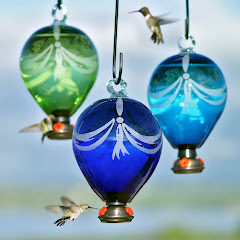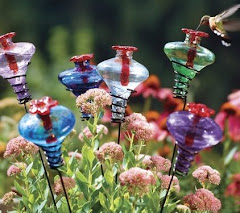Friday, October 10, 2008
"Fall" in love with mulching
I'm looking out my living room window and see treetops touched with gold, flaming orange, russet and burgundy. Autumn is my favorite time of year - the chill in the air, getting my sweaters out from storage, a hot chai tea at the last farmer's market of the year. I get invigorated taking my beagle, Chester, out for his walk... seeing nature turn itself toward the next season. Fall happens so beautifully, colors lingering and then fading.
I'm more aware of my connection with the plants around me in Fall - Spring always comes as a surprise ("Hey look! the trees have budded this weekend!") and Summer I'm busy "doing" instead of "looking". I get a chance to slow down and appreciate what's around. But before I snuggle up with my down blanket and a j.d. salinger novel, I know I need to prepare my garden for the cold weather that's coming.
Preparing your garden for winter will help your hummingbird plants survive harsh weather, and keeps the work you'll do in spring down to a minimum. One of the best and least expensive things to do now is to mulch, mulch, mulch!
Mulching brings organic material into your soil and the extra nutrients will feed your hummingbird plants throughout the cold and frozen months.You don't have to look far to find organic mulch - it's what's falling from your trees right now! Harvest the falling leaves from the trees in your yard for inexpensive and quick composting material to add to your flowerbeds. Handheld mulchers will make short work of a pile of leaves, and you won't be bagging up trash bag after trash bag of recyclable material to go to a landfill.
Other great materials for mulch are tree and bush clippings. Many arborists will gladly donate their yard waste (they have it by the truckload this time of year!) and mulching small branches will give you a more substantial mulch than leaves alone. Beware of pine needles and your hummingbird plants though - pine needles are very acidic and you have to make sure your plants can tolerate a rise in acidity. Mulching helps your garden retain moisture, delivering water to the soil by preventing evaporation. Mulch should be porous, allowing air and water through. If you have hummingbird plants that need extra heat (plants that thrive in full-sun) use decorative rock for mulch. Rocks reflect light and hold heat much more than wood or "soft" mulches.
If you're looking to create new flowerbeds for spring, now is the time to let Mother Nature to do the yard work. Last year I wanted a new patch in my yard to grow pumpkins (I have a great batch of jack-o-lanterns now!). I laid out the area I needed and used layers of newspaper and cardboard weighted down with bricks over the turf I needed to remove. By spring the turf was dead from "suffocation" and lack of light, and the area was easier than pie to rota-till. Since the grass was changed to a soft mulch, I also did not have to amendthe soil much with extra compost and fertilizer!
I'm more aware of my connection with the plants around me in Fall - Spring always comes as a surprise ("Hey look! the trees have budded this weekend!") and Summer I'm busy "doing" instead of "looking". I get a chance to slow down and appreciate what's around. But before I snuggle up with my down blanket and a j.d. salinger novel, I know I need to prepare my garden for the cold weather that's coming.
Preparing your garden for winter will help your hummingbird plants survive harsh weather, and keeps the work you'll do in spring down to a minimum. One of the best and least expensive things to do now is to mulch, mulch, mulch!
Mulching brings organic material into your soil and the extra nutrients will feed your hummingbird plants throughout the cold and frozen months.You don't have to look far to find organic mulch - it's what's falling from your trees right now! Harvest the falling leaves from the trees in your yard for inexpensive and quick composting material to add to your flowerbeds. Handheld mulchers will make short work of a pile of leaves, and you won't be bagging up trash bag after trash bag of recyclable material to go to a landfill.
Other great materials for mulch are tree and bush clippings. Many arborists will gladly donate their yard waste (they have it by the truckload this time of year!) and mulching small branches will give you a more substantial mulch than leaves alone. Beware of pine needles and your hummingbird plants though - pine needles are very acidic and you have to make sure your plants can tolerate a rise in acidity. Mulching helps your garden retain moisture, delivering water to the soil by preventing evaporation. Mulch should be porous, allowing air and water through. If you have hummingbird plants that need extra heat (plants that thrive in full-sun) use decorative rock for mulch. Rocks reflect light and hold heat much more than wood or "soft" mulches.
If you're looking to create new flowerbeds for spring, now is the time to let Mother Nature to do the yard work. Last year I wanted a new patch in my yard to grow pumpkins (I have a great batch of jack-o-lanterns now!). I laid out the area I needed and used layers of newspaper and cardboard weighted down with bricks over the turf I needed to remove. By spring the turf was dead from "suffocation" and lack of light, and the area was easier than pie to rota-till. Since the grass was changed to a soft mulch, I also did not have to amendthe soil much with extra compost and fertilizer!
Subscribe to:
Post Comments (Atom)

Hummingbird in Napa, CA



No comments:
Post a Comment